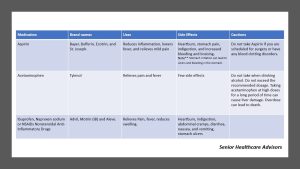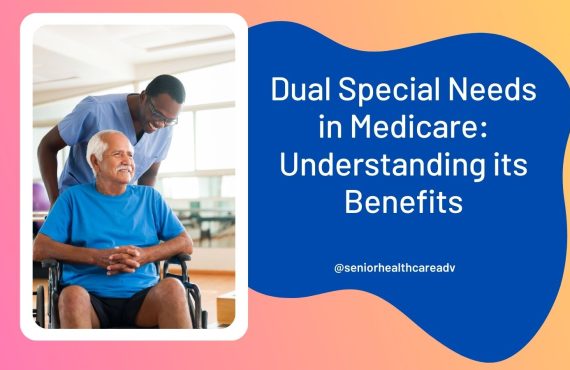There are many types of over-the-counter (OTC) medications people take for joint pain. Most of the products depend on only a few ingredients to relieve joint pain.
BE CAREFUL when combining OTC medications!!
Many over-the-counter OTC medications contain the same ingredients, so it is essential to know what the ingredients are in the medications you take. Because if you take a combination of OTC medications you bear the risk of increased side effects and possible death.
For instance, some OTC pain relievers contain acetaminophen and aspirin in a single pill. Some OTC medications combine aspirin, acetaminophen, antihistamines and decongestants to aid in pain relief and sleep.
Always check with your pharmacist or physician to see if it is OK to combine medications, such as when you have the flu. But, if you have long-term joint pain and you feel you need more than one medication, have your doctor give you separate prescriptions, so you are sure to get the correct dose of each medication.
Capsaicin is derived from chili peppers, and is one of the OTC ingredients in various topical creams and ointments. They are warming and help soothe the pain in your joints.
Supplements to look for when experiencing joint pain:
Note: Always consult your doctor before trying a new supplement, as some can have dangerous drug interactions and can cause side effects.
- Glucosamine Sulfate
- Boswellia Extract
- Chondroitin Sulfate
- Turmeric Curcumin
- Ginkgo
- Boswellia
- Bromelain

Ways to Remedy your Joint Pain
- Manage your weight. Weight gain can have a big impact on joint pain and other symptoms associated with arthritis. Added weight puts more pressure and stress on your joints, especially your hips, knees, and feet! Ask your doctor to help you set a weight goal and design a program to assist you in reaching your goal. Losing weight can help your mobility, lower the amount of pain, prevent more damage to your joints.
- Exercise can help you maintain flexibility, strengthen muscles, and manage your weight. Try exercising with a friend or family member. Nature walks are great exercise and also enhance your spirituality. Use low-impact exercises such as swimming (there is no gravity to put pressure on your joints), cycling, and tai chi. Some insurance contracts include exercise programs. Check with your insurance company!
- Use cold and hot therapy. Heat and cold therapies can help relieve the inflammation and pain associated with arthritis. Soaking in a warm bath with Epsom salts can ease the stiffness. Cold therapy reduces inflammation, swelling, and joint pain. Wrap an ice pack or a bag of frozen peas in a towel and apply to the affected joints for quick relief. Note** Never apply ice cubes directly onto your skin.
- Follow a healthy nutrition plan. Eating whole foods, fresh vegetables and fruits can help boost your immune systems and offer you a better quality of life overall. Plant based products are full of antioxidants, which helps your body to eliminate free radicals and reduce inflammation. Likewise, a diet rich in processed foods, added sugar, red meat, and saturated fats can aggravate symptoms associated with arthritis and joint pain. Those foods also contribute to the development of heart disease and hypertension.
- Acupuncture works! This ancient Chinese treatment for joint pain has been practiced for centuries. It involves placing thin needles into very specific points in your body that reroute your energies and restore balance to your body, and the risks of harm are very low. Just make sure you go to a reputable and licensed acupuncturist for treatment.
- Who doesn’t love a massage? Massage is a great way to practice self-love and to manage joint discomfort. It just makes you feel better all over!
Don’t Let Joint Pain Slow You Down
Many if not most seniors struggle with joint pain making daily activities challenging the senior’s mobility can be affected. Older adults should not ignore continuous joint pain but should promptly seek medical attention. Preventive care for joint pain includes staying active, maintaining a healthy weight, and avoiding activities that put unnecessary pressure on the joints. OTC (over-the-counter) ice packs and pain medications may offer temporary relief, but an evaluation by a doctor is necessary to address the underlying cause of chronic joint pain.
Most Medicare Advantage plans offer additional benefits including a prepaid debit card for OTC medications and items.
Fibromyalgia
Fibromyalgia is a medical condition that causes widespread pain all over the body, insomnia, fatigue, and mental and emotional distress. Over 4 million adults in the United States have been diagnosed with Fibromyalgia. Fibromyalgia is usually diagnosed by the doctor using the patient’s blood work analysis, history, X-rays, and a thorough physical examination. The cause is unknown for fibromyalgia, but, the good news is that it can be managed and treated effectively!
Common Symptoms of Fibromyalgia
- Widespread joint stiffness and pain
- Lethargy, tiredness, and fatigue
- Anxiety and depression
- Insomnia
- Problems with concentration, thinking, and memory
- Migraines
- Jaw pain (TMJ), and pain in the face
- Digestive problems
- Abdominal pain such as constipation, bloating, and irritable bowel syndrome (also known as IBS).
Fibromyalgia can affect the quality of your life, and cause pain and disability. People affected by fibromyalgia chances of hospitalization are doubled, and are three times more likely to suffer from major depressive disorders. Often fibromyalgia accompanies various types of arthritis, lupus, and other types of joint or bone disorders.
Psychological assessments are necessary to uncover any underlying depression. It is very difficult to live in chronic pain, and sometimes people can be cruel. “She is always sick” “It’s all in his head” and “What’s wrong now?” statements can lead to isolation, depression, and even suicidal thinking.
While managing fibromyalgia is multifaceted, seeking appropriate healthcare resources is essential. For seniors navigating healthcare options, including Medicare Advantage plans, it’s crucial to explore coverage for conditions like fibromyalgia and related mental health needs. Senior health insurance plans often offer comprehensive benefits, including coverage for chronic conditions, mental health services, and even dental and vision care. Accessing resources like Medicare advisors can help seniors make informed decisions about their healthcare, ensuring they receive the support they need to manage conditions like fibromyalgia effectively.
The Importance of Sitting Posture and Healthcare
Sitting posture is usually the result of habits formed over the course of your lifetime. Many times we notice other people’s poor posture without realizing that our own sitting posture needs improvement too. Sitting hunched over is very noticeable!
Sitting correctly involves practice and training yourself to deal with gravity with the least amount of tension and strain on the body parts that support you. Keeping your joints and bones aligned keeps them in optimal health and reduces the wear and tear that accompanies aging. Sitting properly aligned improves circulation, helps to keep your blood vessels and nervous system healthy, and lowers the chances of chronic back and neck pain.
Improper sitting positions can lead to back and neck pain, headaches, constipation, and poor digestion (acid reflux). It is also a major factor in developing osteoarthritis. Sitting aligned can lower muscle strain and fatigue and help to keep your joints lubricated and healthy.
Sitting in a slouched position for extended periods of time stresses your lower back. It puts pressure on your spine, including the muscles, intervertebral discs, and ligaments.
When considering healthcare options, especially for seniors, it’s crucial to think about preventive measures. Medicare Advantage plans offer a range of benefits tailored to seniors’ needs, including dental insurance coverage for seniors, vision coverage, and hearing insurance plans. These plans often include over-the-counter benefits and may even cover senior dental implants.
Elderly healthcare services encompass various aspects of well-being, including long-term care options and disability insurance. Medicare Advantage plans provide comprehensive coverage and assistance, ensuring that seniors receive the healthcare they deserve.
By maintaining good sitting posture and exploring suitable healthcare options such as Medicare Advantage plans, seniors can enjoy improved quality of life and better overall health outcomes.
Medicare Advantage Over the Counter Card (OTC)
Over-the-counter (OTC) cards are an added benefit of Medicare Advantage plans that aids in streaming the process of buying OTC products and medications for those possessing the card. Card balances are refilled on a set schedule and those holding policies can use their OTCards to purchase itmes that are covered by their insurance policy at participating retailers.
How do I find out if my Medicare Advantage plan offers an OTC card?
To find out if your Medicare Advantage plan offers an over-ther-counter card:
- Review your plan’s materials, including the Annual Notice of Change and Evidence of Coverage.
- Visit your insurance provider’s website
- Speak to customer service, visit their website, or attend information sessions if available.
- Your pharmacist may also have information, and checking your plan’s member portal is another option to access OTC benefit details.
HEAT OR ICE: RULE OF THUMB: WHICH TO USE
***Rule of thumb for most injuries: Ice first, heat later.***
We all bump into some corner of a table, end of a desk, etc. Most of those types of injuries (bumps, knocks and bruises) make your body react with swelling or inflammation. Ice is used to reduce swelling to the injured tissue or joint by cooling it down. But avoid using them in tandem except as directed by your doctor. Heat feels so good! But watch out! It can cause an undesired reaction, such as increased swelling.
Can I use my Medicare Advantage OTC card to buy items for someone else?
Yes, but the balance is deducted from your card. However, the primary intent of the OTC card for the cardholder’s use, not for others.
***Disclaimer: A Senior Healthcare medical specialist has reviewed this information. It is for educational purposes only and is not intended to replace the advice of your doctor or other health care provider. We encourage you to discuss any questions or concerns you may have with your provider.












